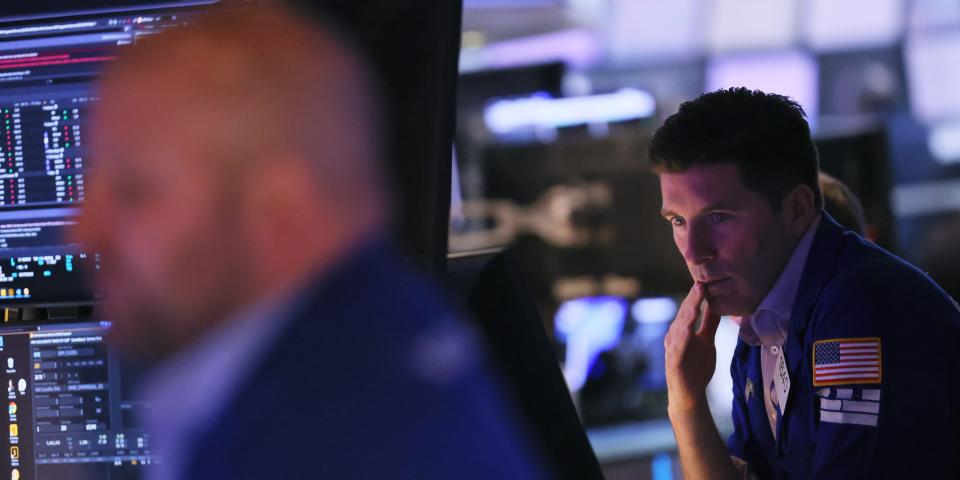
-
Beneath all the fanfare around AI are serious economic risks facing the United States today.
-
These include historically high interest rates, recession risks and slowing growth in China.
-
Here are the grim economic realities facing the United States, despite all the excitement about AI.
Investor enthusiasm for the rise of artificial intelligence could mask some serious risks facing the US economy today.
The world of business and finance has been abuzz about the game-changing tech after the sensational debut of OpenAI’s ChatGPT – and that’s fueled a sizzling rally in tech stocks as valuations of AI-friendly companies soar skyrocketed and inflated the wealth of Big-Tech CEOs.
But underneath it all lurks a US economy facing grim realities, painting a picture in stark contrast to the bullish stock market.
Here are some of the top economic risks facing the nation today amid all the AI craze.
High interest rates
The Federal Reserve has raised interest rates by 500 basis points over the past 15 months – the biggest hike in four decades – to rein in historically high inflation. Benchmark rates in the United States are currently the highest since 2007, just before the global financial crisis hit.
And while the Fed managed to drastically cut inflation and leave rates unchanged this month, it still signaled two more 25 basis point hikes by the end of the year. The annual pace of consumer price inflation has fallen to 4% from last year’s peak of 9.1%, but still remains double the central bank’s 2% target.
This could heighten the risk of an economic slowdown, according to several market experts. Rising borrowing costs have already hurt interest-rate sensitive sectors of the US economy, including the banking sector and the commercial real estate market.
Some investors fear that US stocks could be the next to suffer if the Fed continues to tighten policy. This encouraged short sellers to bet over $1 trillion against US stocks despite their current bull run.
Recession risk
Given the outlook for higher rates and lingering inflation, market commentators including economist Nouriel Roubini and Elon Musk, as well as Wall Street banks such as JPMorgan, have warned of an impending recession in the UNITED STATES.
According to the Fed itself, its recession probability model shows that there is a 70% chance that the US economy will experience an economic slowdown by May 2024.
It might even put a damper on the AI hype, according to Kelvin Wong, senior market analyst at OANDA.
“Overall, a higher interest rate environment for longer is likely to further increase funding costs, coupled with a looming global recession that could put downward pressure on corporate profit margins.” , he said in a daily bulletin.
“All things being equal, such a scenario will likely reduce enterprise budgets and demand for technology hardware and software upgrades that could have a dampening effect on current AI optimism,” Wong added.
Commercial real estate issues
A commercial real estate crisis could be brewing in the United States, with tens of billions of dollars in assets sliding into the distressed category as high interest rates squeeze borrowers.
The amount of distressed CRE assets, i.e. properties that must be sold because owners cannot afford to pay their mortgages, jumped 10% in the first quarter to around $64 billion. , according to an MSCI Real Assets report, cited by Bloomberg. According to the outlet, an additional $155 billion in assets are at risk of going bad.
CRE mortgage delinquencies rose 3% in the first three months of 2023, according to the Mortgage Bankers Association.
Owners of commercial properties in the United States have struggled over the past year as large interest rate increases by the Federal Reserve – aimed at calming inflation – have reduced their ability to weather the storms. mortgage payments. At the same time, tighter credit conditions and work-from-home trends are adding pressure on the sector.
This has sparked widespread concern that commercial real estate could be the next sector to descend into turmoil, following the chaos in the banking sector in recent months.
China’s economic slowdown
While the US economy grapples with internal economic issues, it also faces external risks: primarily, slowing growth in China.
After years of lockdown under Beijing’s strict zero COVID policy, economists had hoped the Asian economy would see a strong rebound after reopening this year. But that’s far from what happened.
As Insider’s Linette Lopez reports, China’s economy is in more trouble than previously thought, with slowing trade, weak industrial production numbers and growing debt – and that’s a problem for Wall Street. .
Read the original article on Business Insider

